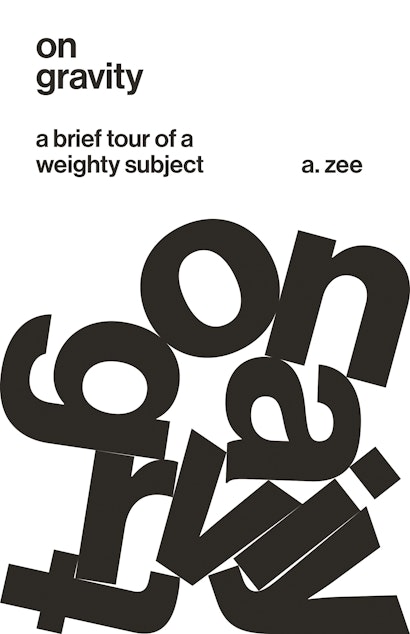Of the four fundamental forces of nature, gravity might be the least understood and yet the one with which we are most intimate. From the months each of us spent suspended in the womb anticipating birth to the moments when we wait for sleep to transport us to other realities, we are always aware of gravity. In On Gravity, physicist A. Zee combines profound depth with incisive accessibility to take us on an original and compelling tour of Einstein’s general theory of relativity.
Inspired by Einstein’s audacious suggestion that spacetime could ripple, Zee begins with the stunning discovery of gravity waves. He goes on to explain how gravity can be understood in comparison to other classical field theories, presents the idea of curved spacetime and the action principle, and explores cutting-edge topics, including black holes and Hawking radiation. Zee travels as far as the theory reaches, leaving us with tantalizing hints of the utterly unknown, from the intransigence of quantum gravity to the mysteries of dark matter and energy.
Concise and precise, and infused with Zee’s signature warmth and freshness of style, On Gravity opens a unique pathway to comprehending relativity and gaining deep insight into gravity, spacetime, and the workings of the universe.
Awards and Recognition
- One of Choice Reviews' Outstanding Academic Titles of 2018
"If you already know a bit about the topic, and are not afraid of a few equations, On Gravity will take you deeper (if you are very brave, the appendix will even explain the meaning of curved space-time)."—John Gribbin, Wall Street Journal
"On Gravity . . . begins its tour of Einstein’s general theory of relativity with the discovery of gravitational waves, and lands the reader deep in the mysteries of dark matter and energy."—Liz Else and Simon Ings, New Scientist
"[On Gravity] is exactly what is needed to communicate to the general public the beauty and depth of Einstein’s theory of gravity. . . . For anybody with a desire to understand what is happening at the forefront of our exploration of the universe, this is a perfect start."—Mathemafrica
"[On Gravity] is concise, timely . . . [and] by the end of the book, you will be breathless, but up to date with the latest advances in the science. It’s a tour intended to take the reader a step beyond a popular treatment and give a deeper glimpse of the beautiful and uncompromising structure underlying the theory."—Tara Shears, Times Higher Education
"With On Gravity, Zee decides to shoot for a middle ground in terms of level of sophistication. . . . [F]or those who want to move beyond popular books about gravity, but aren’t ready for a massive textbook with advanced mathematics, On Gravity does provide more insights about how gravity works without getting too complex. Gravity may be absurdly weak, but that doesn’t mean it’s easy to fully understand, or overcome."—Jeff Foust, Space Review
"This is a lovely little book which is a perfect dip into this realm of physics which we are now, for the first time, able to see with some of the most technologically marvellous experiments imaginable."—Jonathan Shock, Mathemafrica
"On Gravity offers a new and refreshing base from which to delve deeper than most popular-science books into the most pressing problems in fundamental physics."—Benjamin Skuse, Physics World
"On Gravity is a delightful and engaging tour of Einstein’s great triumph—the general theory of relativity—by one of our best tour guides, A. Zee. A fun and fascinating read."—David Kaiser, Massachusetts Institute of Technology
"This engaging and enjoyable book focuses on our modern understanding of gravity through general relativity. With an entertaining narrative, Zee examines the development of these concepts and how they mesh with other discoveries in physics. On Gravity makes for compelling reading."—Pedro Ferreira, author of The Perfect Theory
"Rigorous and original, On Gravity provides an insightful presentation of the key concepts of gravity and general relativity. This book gives a different and new perspective and will surely generate interest." —Alberto Vecchio, University of Birmingham

